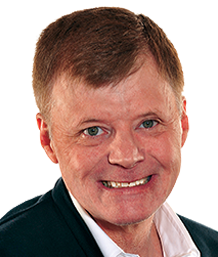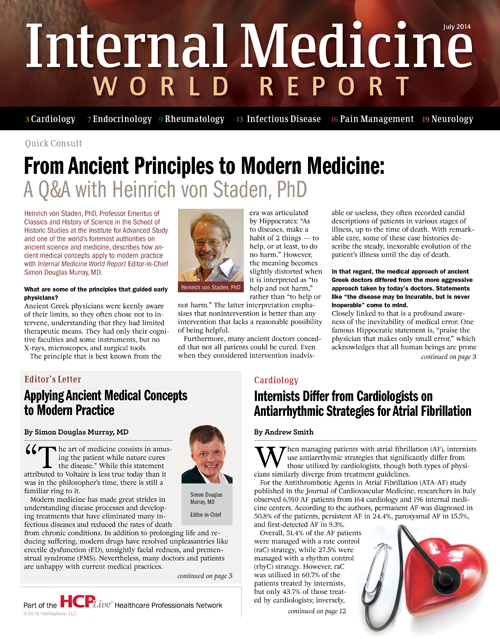Applying Ancient Medical Concepts to Modern Practice
"The art of medicine consists in amusing the patient while nature cures the disease." While this statement attributed to Voltaire is less true today than it was in the philosopher's time, there is still a familiar ring to it.

Simon Douglas Murray, MD
Editor-in-Chief
“The art of medicine consists in amusing the patient while nature cures the disease.” While this statement attributed to Voltaire is less true today than it was in the philosopher’s time, there is still a familiar ring to it.
Modern medicine has made great strides in understanding disease processes and developing treatments that have eliminated many infectious diseases and reduced the rates of death from chronic conditions. In addition to prolonging life and reducing suffering, modern drugs have resolved unpleasantries like erectile dysfunction (ED), unsightly facial redness, and premenstrual syndrome (PMS). Nevertheless, many doctors and patients are unhappy with current medical practices.
A 2012 Harris poll that asked patients to rate their satisfaction with their most recent visit to a healthcare provider found 17% were dissatisfied with the visit — a level comparable to those observed for mobile phone store visits and health insurance company interactions. While many factors contribute to patients’ satisfaction, one top concern is the perceived knowledge, training, and expertise of the physician. Nevertheless, it is generally accepted that the public is not qualified to define a doctor’s degree of knowledge and training, as those who are more willing to comply with any requests for prescriptions or tests, however unnecessary, may be misjudged as being more clinically competent.
This issue of Internal Medicine World Report contains lessons from ancient medicine that apply to current practices. For instance, ancient Greek physicians were well aware of the limitations of medicine, so today’s doctors must remember that modern medicine is limited in what it can do, and not every patient can be saved. From time to time, physicians have to accept that other legitimate medical philosophies may offer some benefit to patients. However, when an alternative practice seems dangerous, physicians have an obligation to warn patients about the risk, whether or not they believe it.
Modern physicians also have to accept that what they believe to be true may not always be accurate. A recent review that examined class 1 recommendations in clinical practice guidelines from the American Heart Association (AHA) and the American College of Cardiology (ACC) found many of the recommendations were downgraded, reversed, or omitted in subsequent versions of the guidelines. Thus, truth in medicine is provisional, based on the best evidence available at the time, and the only certainty is that it will change.
The ancient Greek physicians realized they could not understand a patient’s illness without knowing the context of his or her environment, family life, and social and dietary habits. While American doctors better understand diseases, they do not know enough about patients’ health. Consequently, today’s best doctor might be a combination of a personal trainer, nutritionist, psychologist, and traditional physician.
Since the ancient physicians stressed that health results from the positive influence of different external factors, not merely the absence of disease, today’s physicians should pursue healthy activities outside of work. While that may seem counterintuitive, you can actually become more productive by working less.
The ancient Greek physicians also recognized that making an accurate diagnosis involves carefully recording the patient’s story as it unfolds. As a result, physicians of ancient times limited their practices to a small number of patients, which allowed them to make careful observations and elicit detailed histories. However, today’s physicians see 30 or more patients a day and are doing little more than writing prescriptions, sending referrals, and putting out fires. It is impossible to adequately learn the personal lives of thousands of patients. In attempting to do so, medicine very quickly becomes burdensome.
One solution is to hire so-called physician extenders, which, in my opinion, is a shortsighted option, because it conveys the message that almost anyone can do what doctors do. At one time, we were called physicians, but now, we are called prescribers and, in New York State, medical vendors.
A better approach is to carefully select associates with like-minded philosophies who can help ease excessive patient volumes. Although it is harder to find such physician associates in this era of primary care shortages, it is still possible.
In the end, patients don’t care if you are a top doctor, as long as you are their top doctor. They also don’t care about how much you know, they just want to know that you care.
Simon Douglas Murray, MD
Editor-in-Chief
Simon Douglas Murray, MD, is Clinical Assistant Professor of Medicine at Robert Wood Johnson Medical School in New Brunswick, NJ, and Senior Attending in the Department of Medicine at the University Medical Center at Princeton. He has been affiliated with the MDVIP physicians network since 2006 and currently practices internal medicine in Princeton, NJ.
